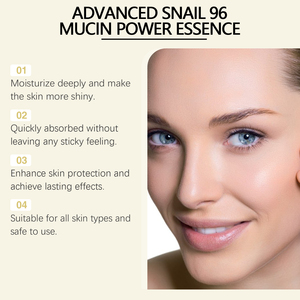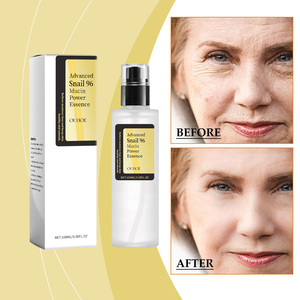
All categories
Featured selections
Trade Assurance
Buyer Central
Help Center
Get the app
Become a supplier

(200779 products available)





















































An essential serum is a skincare product that targets specific skin concerns. They contain active ingredients that help improve the skin's appearance and health. The essential oil serum is lighter and has smaller molecules. It penetrates deep into the skin for maximum effect. Here are the main types of essential serums:
Vitamin C Serums
These are popular essential oil formulas. They have potent antioxidants that help fight free radicals. This protects the skin from environmental damage. Vitamin C serums also brighten the skin and reduce dark spots. They improve the skin texture and increase collagen production for firmer skin.
Hyaluronic Acid Serums
This is the best hydrating serum. It has a unique ability to hold up to 1000 times its weight in water. The serum keeps the skin hydrated and plump. It reduces fine lines and gives a youthful look. Some have added ingredients like vitamin B and C for extra benefits.
Retinol Serums
Retinol is a vitamin A derivative. It helps to hasten skin cell turnover. The serum keeps the pores clean and prevents acne breakouts. It diminishes fine lines and wrinkles for a more youthful look. It also improves the skin texture and reduces dark spots. Some retinol serums have soothing ingredients to reduce irritation.
Peptide Serums
Peptides are short chains of amino acids. They promote the production of collagen and elastin for firmer skin. The serum reduces the appearance of wrinkles. It gives a smooth and youthful look. Some peptide serums have antioxidants to protect the skin from damage.
Niacinamide Serums
Niacinamide is vitamin B3. It has many skin benefits. The serum controls oil production to reduce acne. It improves the skin texture and reduces the appearance of pores. Niacinamide also fades dark spots and improves skin tone. It helps to calm skin irritation and increase hydration.
Glycolic Acid Serums
This is an alpha hydroxy acid (AHA) from fruits. It exfolinates the top layer of the skin. Glycolic acid serums improve skin texture and make it smooth. It reduces fine lines, wrinkles, and dark spots. Some glycolic serums have ingredients that add moisture to the skin.
Tea Tree Oil Serums
Tea tree oil comes from the leaves of the tea tree. It has powerful antimicrobial and anti-inflammatory properties. The oil helps to treat acne by killing bacteria. It soothes the skin and reduces redness. Some tea tree oil serums have ingredients that add moisture to the skin.
Choosing an essential oil serum requires careful consideration to ensure that one picks a product that will maximize the benefits for the skin. Here are some of the important factors to consider:
Identify Skin Type and Concern:
Check the skin type, whether dry, oily, sensitive, or combination, and identify specific concerns like acne, wrinkles, dullness, or pigmentation. This will help in choosing a targeted serum that addresses specific needs.
Check Ingredients:
Choose an essential oil serum with natural and organic ingredients. Avoid those with synthetic additives, chemicals, or artificial fragrances. Read the labels and pick those with vitamins, hyaluronic acid, and antioxidants that benefit the skin. Avoid serums with ingredients that may irritate, like parabens, sulfates, alcohol, or harsh chemicals. Many essential oil serum manufacturers provide a complete list of ingredients to make the selection easier for buyers.
Consider Sensitivity:
Choose serums with few ingredients for sensitive skin to avoid potential irritation. Look for hypoallergenic formulas that are less likely to trigger reactions. Test a small serum patch before widespread use to ensure it doesn't irritate or cause allergic reactions.
Check Brand Reputation:
Look for brands that are known for quality and have positive customer reviews and feedback. Check the manufacturer's website, social media platforms, or third-party review sites like Google reviews, Trustpilot, or YouTube. Consider the certifications, like organic or cruelty-free, and the brand's commitment to transparency and quality assurance.
Consider Skin Compatibility:
Choose serums compatible with the skin type and sensitivity. Pick items formulated for specific skin types or general use on all skin types. Consider the serum's pH level and how it aligns with the skin's natural pH for better harmony without disruptions.
Check Concentration and Efficacy:
Consider the effectiveness of the serum ingredients and their concentration. Look for proof of efficacy in clinical studies or customer testimonials. Balance potency with gentleness for maximum benefits without irritation.
Consider Texture and Absorption:
Choose serums with textures that feel good on the skin, like light gel or water-based formulas for quick absorption. Look for fast-absorbing serums that leave no residue for effective ingredient delivery and comfort in the skincare routine.
Check Packaging:
Pick essential oil serums with high-quality, protective packaging that shield contents from light and air. Look for glass bottles with dropper lids or pump dispensers for hygiene, dosage accuracy, and longevity of the product without contamination.
Applying an essential serum well is vital for getting the most out of it. Therefore, below is how to use an essential serum for the face and product safety;
How to use
First, wash the face with a gentle cleanser, then pat it dry with a clean towel. This ensures the skin is clean and the serum gets into the skin. Apply a small amount of the essential serum on the fingertip. A pea-sized drop is enough, depending on the type of serum and the area it will be applied. Next, gently dab the essential serum on the face. Focus on areas where it is believed to have the most significant concerns, such as the T-zone for large pores. Spread the serum evenly across the face and neck. Massage it gently in a circular motion until it is fully absorbed into the skin. Allow the essential serum to settle on the skin for at least 90 seconds before applying other skincare products, like essential moisturizers.
Product safety
Product safety is an essential factor that must be considered when using an essential serum. It starts with proper storage. Therefore, users should keep the serum in a cool, dry place away from direct sunlight. This is because sunlight affects the potency of the serum, making it less effective. Always do a patch test before applying the serum to the face. This is because the skin can react with some ingredients in the serum. The patch test can be done by applying the serum on a smaller section of the skin and waiting 24 hours to observe any adverse reactions. Always follow the instructions provided by the manufacturer. This includes recommended usage time, how to apply, and the type of skin it will be applied to. Additionally, always seal the serum container well to prevent air and bacteria from entering the serum.
Anti-aging
Some essential oils have compounds that increase the production of collagen in the skin. This helps to reduce the appearance of fine lines and wrinkles. It gives the skin a more youthful and plump look.
Brightening
Beauty serums with essential oils like orange and lemongrass oil help to brighten the skin. They contain compounds that inhibit the activity of tyrosinase. This enzyme is what stimulates melanin production. Using a brightening serum reduces the appearance of dark spots and hyperpigmentation.
Moisturizing
Beauty serum with essential oils like rosehip oil and avocado oil has compounds that draw moisture into the skin. It keeps the skin soft and supple. It also maintains the skin's moisture barrier to prevent trans-epidermal water loss.
Acne treatment
Some essential oils have anti-inflammatory and antimicrobial properties. They help to treat acne by reducing the size of the pimples. It also prevents the spread of acne-causing bacteria.
Skin soothing
Many essential oils have compounds that soothe skin irritation. Some of them are chamomile, lavender, and green tea. They help to treat redness, rashes, and itchiness.
Size and capacity
Essential serums come in different sizes and capacities. There are small travel-sized serum bottles that hold 15ml. Some large bottles hold 50ml or more. The right size will depend on usage and preferences.
Packaging material
Most essential serum for face are packaged in glass bottles. This is because glass does not react with the serum and alters its compounds. It also provides a premium look to the product. Some bottles are made with plastic for a more lightweight and durable option.
Dispensing method
Essential serums have different dispensing methods. This can be a dropper, pipette, spray, or pump. Each dispensing method has its advantages. For example, a dropper allows for precise measurement and control of the serum.
Type of serum
There are different types of essential serums for the face. Some target specific skin concerns like anti-aging. Others are more of an all-rounder. Choosing the right one will depend on what the buyer wants to achieve with the serum.
Q1. What is the difference between an essential oil and a serum?
A1. An essential oil is a concentrated plant extract that contains the essence of a particular source. On the other hand, a serum is a skincare product with high concentrations of active ingredients. While both essential oils and serums are used in skincare, they serve different purposes. Essential oils are used for their therapeutic properties, and usually, a few drops are added to the serum. On the other hand, oils-based or water-based, essential serums are applied in larger quantities to address specific skin concerns.
Q2. Can essential serums be used every day?
A2. Yes, most essential serums can be used daily, depending on the needs of a person's skin. While some people prefer to use them in the morning and at night, it is important to check the instructions provided by the manufacturers and the ingredients to determine how often they can be used.
Q3. Are essential serums safe for all skin types?
A3. While essential serums are safe for all skin types, it is important to note that not all are compatible. People with sensitive skin should look out for serums without harsh chemicals or potential irritants. Checking the ingredients list and starting with a patch test before using it widely is always a good idea.
Q4. How should essential serums be stored?
A4. Proper storage of essential serums is important to maintain their effectiveness and shelf life. It is advisable to store them in a cool, dry place away from direct sunlight, as exposure to sunlight can break down the active ingredients. In addition, keep them tightly closed to prevent air from entering, which can also degrade the serum. Some essential serums require refrigeration to keep them cool, but check the manufacturer's instructions, as this is not always necessary.
Q5. How long does it take for an essential serum to show results?
A5. The effectiveness and result of an essential serum varies depending on the type and the skin concern it is meant to address. Generally, it can take anywhere from a few days to several weeks for noticeable changes. For instance, serums meant to deal with issues like dryness or brightness can be observed immediately, while those that deal with stubborn skin problems like wrinkles or hyperpigmentation may take longer.